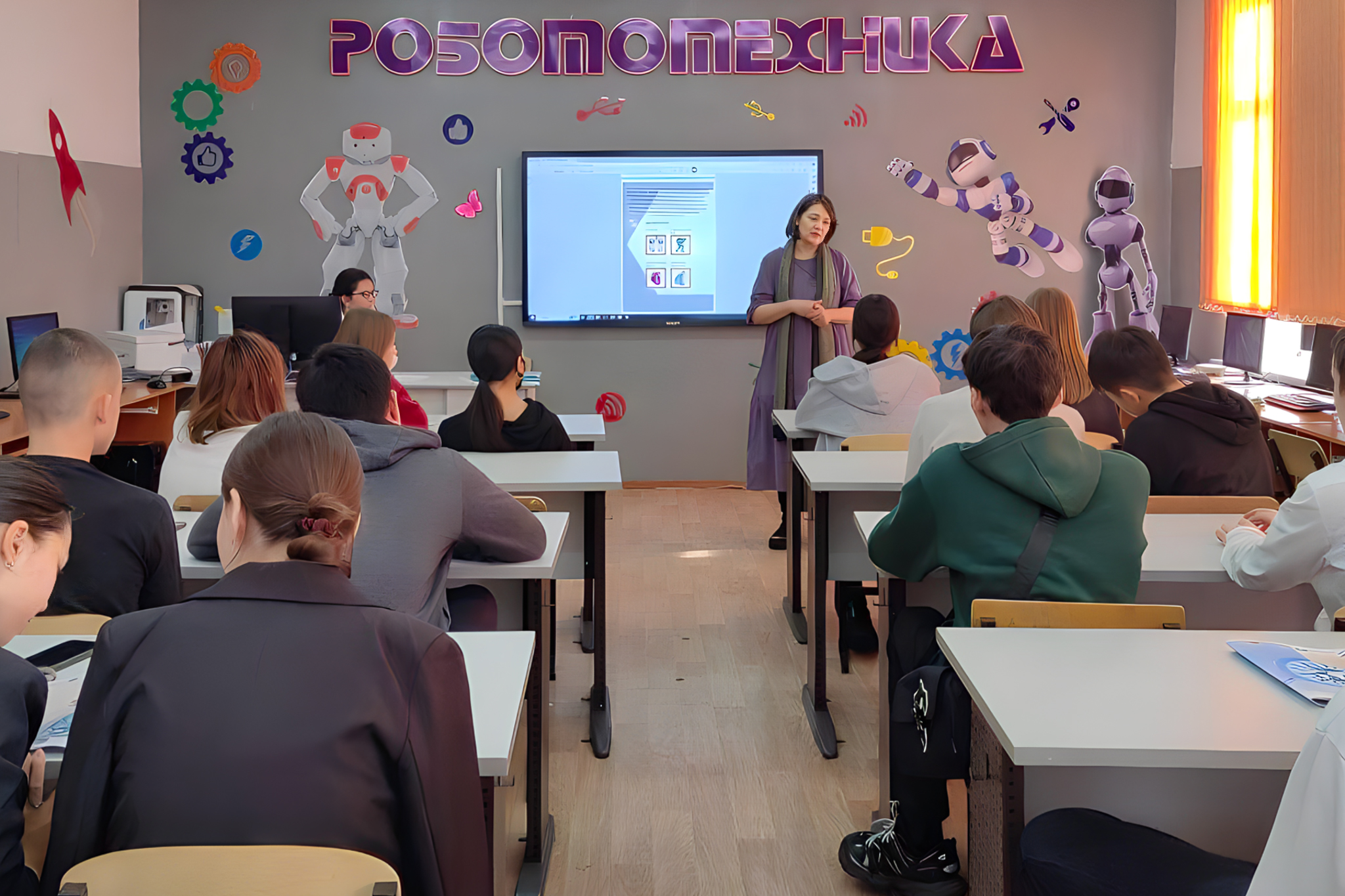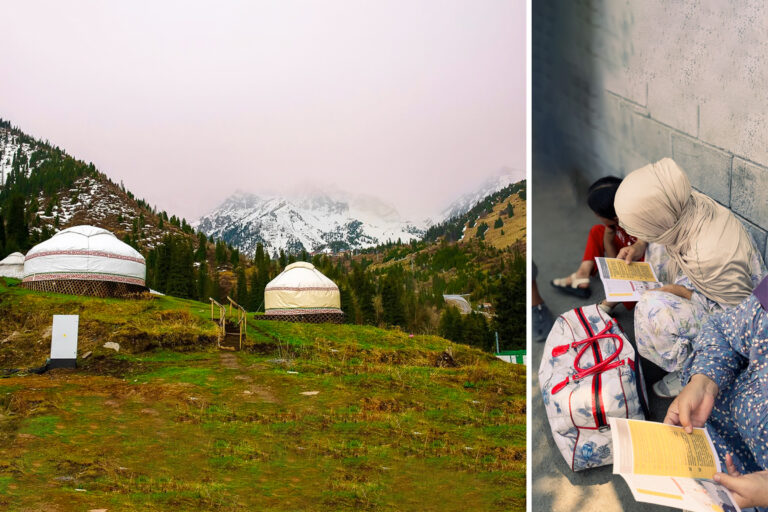
“By supporting parents, we also help children.”
Mariya Romanova
Reflections from an expert at the Taldykorgan Regional Women’s Support Center.
The Taldykorgan Regional Women’s Support Center, established in 1997, offers legal, social, and psychological assistance to women and children. Since its establishment, almost 10,000 women and children have received various kinds of support.
Since 2023, the center has been partnering with Winrock International on the Kazakhstan Actions Against Trafficking in Children project funded by the U.S. Department of State, in Taldykorgan City and Zhetysu region. The project aims to improve identification of child trafficking in persons survivors and accompanying children of migrant laborers and support them with child-sensitive, trauma-informed, comprehensive care in southern Kazakhstan.

Victoria Gorodetskaya, psychologist at the Taldykorgan Regional Women’s Support Center.
Victoria Gorodetskaya, an expert psychologist at the center, spoke about her organization and its notable accomplishments.
Rose: A Case of Stolen Documentation
Rose (name changed to protect her identity) was born in Uzbekistan. She arrived in Kazakhstan after finishing school in the late 1990s, when she was 16 years old. She hoped to enroll in college, but it didn’t work out, so she began working. Rose was on her way home from the market and preparing to pay for a bus ride when she realized her wallet and identification documents had been stolen. Rose contacted the migration service and lawyers, who urged her to return to Uzbekistan, informing her that she would only be able to recover her documents there, but not in Kazakhstan. Unfortunately, she was unable to return to Uzbekistan due to financial constraints, so she remained in Kazakhstan.
Around 2021, Rose experienced a mental breakdown. She went to the doctor to get medical treatment when she found out she was pregnant. Her friend’s mother agreed to help her raise the child. When she gave birth, she was informed that the infant would not receive a birth certificate since her mother didn’t have identity documents. Rose and her friend’s mother attempted to obtain new documents on their own but without knowing the procedures, they were unsuccessful. Rose contacted our center and we began managing her case in January 2024. Now she must return back to Uzbekistan and obtain a new passport. Fortunately, Rose still has her birth certificate, so the process will not take long.
Rose’s newborn son was not issued a birth certificate because his mother did not have a passport or identity card. He has now been registered at birth, but not issued a birth certificate, which is his mother’s way to prove that registration has occurred. We assisted her mother in preparing a form to renounce Uzbek citizenship and proceed through the process of obtaining identification documents.
Even though Rose lost her passport a long time ago, she came to us only when there was an urgent need for her documents. This is a common situation. People find a job, live their lives, and do not worry much about the absence of documentation. They do not realize that, without passports and identity cards, they are at risk of being trafficked. For many years, some individuals in our region lived without documents. Following the collapse of the Soviet Union, some people still live with outdated Soviet passports. If they have resided in Kazakhstan the whole time, it is easy to obtain a new one. However, if they have traveled abroad, they must obtain certificates from several embassies, which delays the process. People often seek our help when they urgently need their documents to be restored, for example to secure benefits, apply for a pension, or, as in the case of Rose, to enroll a child into school.
People find themselves trapped in a vicious cycle, receiving one violation of migration rules after another. There have been cases where people without documents are exploited, forced to do work they didn’t want to do, or not paid for their labor. They were severely exploited, threatened to death, and terrified to be handed over to the police.
In Rose’s case, she now needs to return to Uzbekistan and apply for a temporary residence permit in Kazakhstan. The case is successfully moving towards completion, and we are very happy about it! However, many people are unfamiliar with the steps needed to restore their documents. They often turn to their acquaintances for assistance, but this rarely helps, as some simply make money on them without assisting them.
Alexei: Keeping Family Together

Two years ago, we assisted Alexei (name changed to protect his identity) in his recovery from labor exploitation. He worked on a farm in a remote rural area and tried to escape many times. His exploiters always brought him back, beat him, and forced him to continue working. In the barracks where the workers lived, Alexei met a woman. She eventually got pregnant and gave birth to Alexei’s daughter.
Alexei was the one who delivered the child. The birth of his daughter prompted him to make another attempt to escape. Finally, he succeeded and came to us for help. We provided Alexei and his daughter with shelter, clothes and food. Unfortunately, we were unable to prosecute the traffickers, as Alexei stated to police that he wasn’t held against his will. I suppose he was threatened. In order to force Alexei to drop the charges, Alexei’s trafficker filed an application on behalf of his child’s mother to the guardianship authorities to take this child away from him. So, his trafficker hasn’t been punished. However, our lawyer protected the child, who remained under her father’s care. We restored Alexei’s documents and issued a birth certificate for his daughter. We still stay in touch with his family.
Collaborating to Combat Trafficking
I believe that raising awareness is crucial. We actively work with youth centers, colleges, and schools. We teach children and young people how to stay alert and avoid potential dangers when faced with risky situations, such as when traffickers try to deceive them. We provide youth with the information and skills to protect themselves and their peers. The younger generation is interested in these topics since traveling and working abroad have become much more accessible.
Schools and colleges should also educate students on safe migration and TIP risks. Employers will find it more difficult to deceive young adults when they enter the workforce and thus companies are less likely to exploit employees. Furthermore, we believe collaboration with law enforcement agencies is crucial. This helps to combat TIP and child exploitation in a more effective, coordinated manner, as well as to jointly implement a migration strategy for Central Asian countries. We can only combat the threat together.
This article was funded in part by a grant from the United States Department of State. The opinions, findings and conclusions stated herein are those of the author and do not necessarily reflect those of the United States Department of State.
Related Projects

